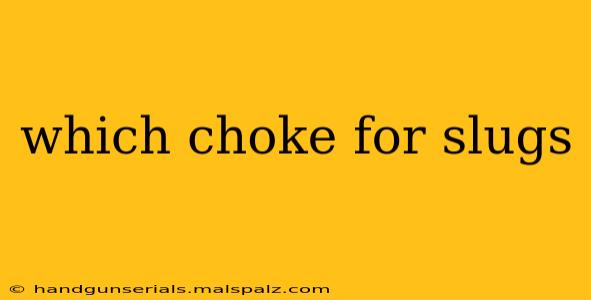Choosing the Right Choke for Slug Shooting
Shooting slugs with a shotgun requires careful consideration of the choke tube you use. Unlike birdshot or buckshot, slugs are single projectiles designed for accuracy at longer ranges. Selecting the wrong choke can significantly impact your accuracy and overall shooting experience. This guide will help you understand the different choke options and determine which is best for your slug gun.
Understanding Choke Tubes and Their Impact on Slug Performance
Choke tubes constrict the barrel's diameter at the muzzle, influencing the shot pattern. While this is crucial for dispersing shot, its effect on slugs is less about pattern and more about consistency and accuracy.
-
Cylinder Bore: A cylinder bore has no constriction. While offering the least restriction, it can lead to inconsistent slug flight due to lack of stabilization. It's generally not recommended for slugs unless you're using a rifled slug barrel.
-
Improved Cylinder (IC): This choke offers a slight constriction, providing marginally better grouping than a cylinder bore. Still, it's not ideal for long-range accuracy with slugs.
-
Modified (Mod): A modified choke offers a moderate constriction, generally providing better accuracy than IC, but still might not be optimal for maximum range or precision.
-
Full Choke: A full choke provides the tightest constriction. While tempting for seemingly better accuracy, it can actually reduce accuracy with slugs due to over-constriction and increased friction, leading to erratic flight and potentially damaging the slug.
-
Extra Full Choke: This extremely tight choke is generally not recommended for slugs, as it creates excessive constriction, negatively affecting accuracy.
Rifled Slugs and Choke Choice
The type of slug you're using dramatically influences the optimal choke choice. Rifled slugs are designed with their own rifling to stabilize in flight, often requiring less constriction from the choke tube. For rifled slugs, a cylinder bore or improved cylinder is usually the best choice. Using a tighter choke can lead to keyholing (the slug impacting the target sideways).
Smoothbore Slugs and Choke Selection
Smoothbore slugs rely on the choke tube to provide some level of stabilization. While a full choke might seem logical, it often results in poor accuracy. A modified choke is generally considered the best compromise for smoothbore slugs, striking a balance between grouping and stability. An improved cylinder might also be suitable, depending on the slug type and your firearm.
Factors Beyond Choke Choice
While choke selection is important, other factors also significantly impact your slug shooting success:
-
Slug Type: Different slug designs (Foster, Brenneke, sabot) exhibit varying degrees of accuracy and stability. Experimentation may be necessary to find the best choke for your specific slug type.
-
Shotgun Model: The barrel length and overall design of your shotgun can influence accuracy.
-
Ammunition Quality: High-quality ammunition is crucial for consistent results.
-
Shooting Technique: Proper shooting technique, including stance, sight alignment, and trigger control, is essential for achieving accuracy with slugs.
Conclusion
The best choke for slugs depends heavily on the type of slug (rifled or smoothbore) and your specific firearm. Experimentation is key to finding the optimal choke for your setup, but remember, generally speaking, avoid extremely tight chokes like full or extra full for slugs. A modified choke often provides the best balance of accuracy and consistency for smoothbore slugs, while a cylinder or improved cylinder is usually preferred for rifled slugs. Remember to always prioritize safety and follow safe firearm handling practices.

